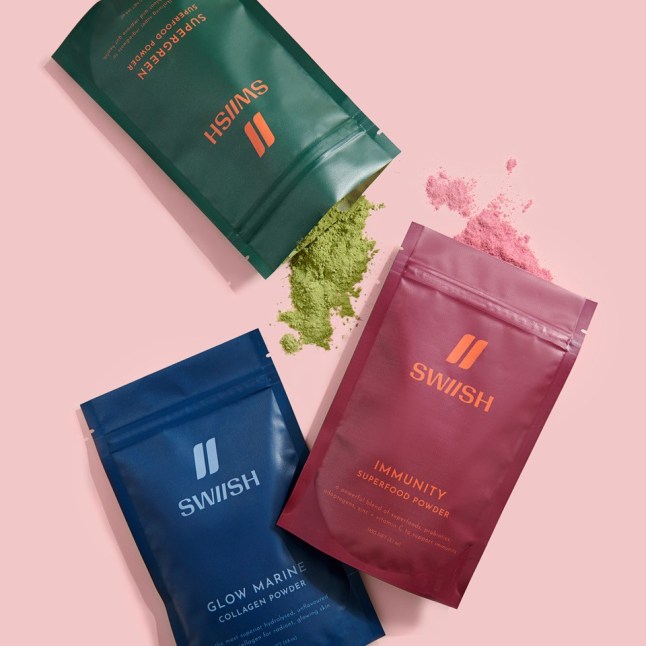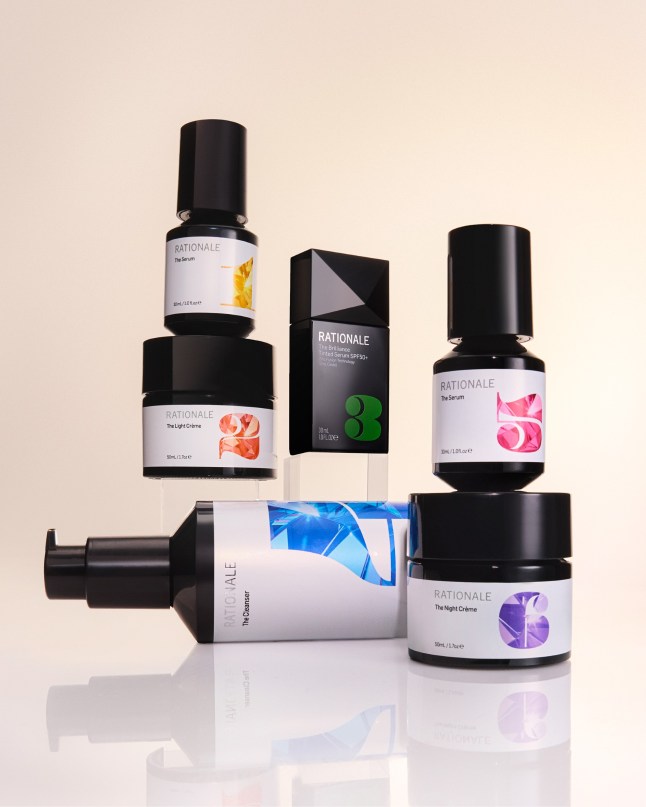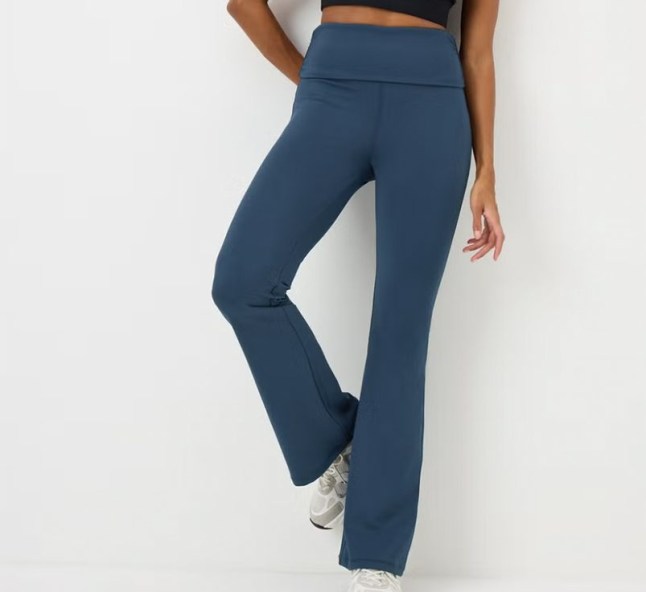30 Jan, 2026 | Admin | No Comments
From Kurt Geiger to Neom, Primark and more – here’s 19 items a shopping expert is buying


Metro journalists select and curate the products that feature on our site. If you make a purchase via links on this page we will earn commission – learn more
I don’t know about you, but I’m still in disbelief that we’ve survived January – the month that lasts roughly 400 days. But the finish line is finally in sight, and honestly, what better way to celebrate than with a little payday pick‑me‑up?
As Metro’s resident shopping obsessive, I’ve once again been unleashed onto the high street, hunting down the freshest drops so you don’t have to. This week, I’m deep in my wellness era – lighting candles like I’m summoning calm, cocooning myself in blankets, adding vases I definitely don’t need, and tracking my sleep as if I’m preparing for the Olympics.
But it’s not all self‑care chic. I’ve also found cosy knits worth hibernating in, earrings to refresh my stack, boots that mean business, and plenty more where that came from.
Trend Trove is, as ever, the place to be — and when it comes to the shopping intel you need, consider me your high‑street Gossip Girl… minus the scandal (sadly).
So, settle in, scroll on, and treat yourself to a little fashion, beauty, homeware and even a cheeky beverage moment. Go on – you’ve earned it.
Best of Metro Deals
Get exclusive discounts with Metro Deals – save on getaways and spa days. Powered by Wowcher
Bannatyne Spa
Spa day for two with treatments, lunch & prosecco — save up to 57% off.

Other deals
Mystery Escape
Hotel stay with return flights from as low as £92pp — save on worldwide holiday packages.
Beach Retreat (Lanzarote)
4* Lanzarote beach holiday with flights — save up to 58%.
UK Getaway
4* Radisson Blu Durham stay with breakfast, spa access & late checkout — save 60% off.
Drive Supercars
3–12 lap supercar driving experiences from £16.99 — save up to 65%.
So, what’s been happening this week? Well, NEXT has launched its first fuller‑bust lingerie edit for DD–K, created with model and presenter Kelly Brook. The collection focuses on proper support; great fit and pieces women want to wear – from plunging silhouettes and breathable power mesh to beautifully detailed lace and pastel sets. Kelly says the range is shaped by years of learning what makes her ‘feel confident, comfortable and genuinely herself’, and she hopes it helps others feel the same. The edit includes 22 lingerie sets, with bras available in sizes DD–K and priced £22-£47, landing February 2 on Next.co.uk and in selected UK stores.
Marks & Spencer is kicking off Spring ’26 with a new denim collection landing in stores and on M&S.com from February 4 – a lineup designed to work hard across women’s, men’s and kids’ wardrobes. As the UK’s number‑one name in women’s denim, M&S introduces new-season fits alongside bestsellers, with over 20 jean styles in eight washes and inclusive sizing from 6–24 with three leg lengths. Highlights include the Patch Pocket Flare, updated ecru washes across hero shapes like the Barrel and Palazzo, and fresh denim separates such as the Denim Bomber and Crease Front Barrel Jeans. Menswear gets a modern refresh too, tapping into 2026’s straight, tailored silhouettes and refined indigo-to-ecru washes, while Kids offers easy, relaxed pieces made for layering and weekend wear. Thoughtfully designed and built to last, with its denim made to be lived in, all season long.
My absolutely, favourite beauty brand of the moment MERIT, has just announced its first big launch of 2026, Signature Lip Blush – a next‑generation sheer matte lipstick designed for ultimate wearability. It delivers that soft, blurred matte look without any of the dryness, thanks to a balm‑like formula that’s light, buildable and effortless. One swipe gives a natural wash of colour; a few layers add impact, all while feeling weightless. Available in eight easy, everyday shades – from warm nude Vendome to berry Framboise – the formula features gel‑wrapped pigments, an olive‑infused base and a collagen‑supporting active for smooth application and lasting hydration. Created to fade naturally without feathering, it’s a modern matte that feels comfortable all day. Signature Lip Blush launches February 2 on meritbeauty.com and at Sephora for £25. Get in!
For those looking to improve things around the house, George Home has dropped its Spring/Summer 2026 collection, introducing four new trends – Crafted Calm, Wild Country, Creative Pursuits and In Bloom – offering an easy way to switch up any space, whatever your style. From playful tomato‑print towels and party‑themed bedding to calming stoneware, whimsical florals and ranch‑inspired décor, the range spans more than 670 new pieces starting from just £1. Standouts include the Party Pantry duvet (from £10), chunky stem glassware (£16 for four), Wild Cowboy bedding (£10) and Blue Stem coupes (£8 for two). Designed to suit every taste and budget, the new trends are available now in selected stores and at George.com.
I love that Boots is stepping up its wellness game with the arrival of Australian supplement brand SWIISH, bringing their science‑led formulas and proactive approach to health into selected stores and online. With options for immunity, gut health, sleep, energy and overall vitality, it makes building simple, everyday rituals feel so much more achievable. And with wellness becoming such a priority for so many of us, it’s clear Boots is leaning into that shift — offering more choice, more innovation and genuinely useful products that fit around real life.
Finally, I’m always excited when a truly science‑driven beauty brand lands in the UK, so RATIONALE arriving at Harrods this month feels huge. The Australian brand has built a cult following for its rigorous, research‑led formulas, and its Essential Six system: a day‑and‑night ritual built around protection and repair – is finally landing here alongside its solar‑protective Beautiful Balms. With more than 30 years of dermatological research behind it and founder Richard Parker’s obsession with reversing sun damage, it’s skincare with serious credentials. And honestly, I love that it’s all about luminous, resilient skin powered by real science, not hype.
And now for the fun part, 19 items you’re going to want to look at, maybe add to cart and wait by the door for the postman to arrive with your new goodies.

Kurt Geiger Kensington Bag
I’m completely charmed by this Kensington bag – it’s one of those accessories that feels playful but still ridiculously chic.
The floral printed satin gives it that soft, glossy finish I always fall for, and I love how the removable satin scarf is braided through the top handle; it’s such a sweet, unexpected detail that makes it feel instantly more elevated.
And then there’s the signature antiqued brass eagle head, sparkling with crystals and little black bead eyes – a proper show‑stopping touch on the front flap that gives it that unmistakable Kurt Geiger attitude.

M&S Collarless Utility Jacket With Linen
I’m obsessed with this jacket – it’s one of those pieces you throw on once and instantly wonder how you lived without it.
Made with linen, it’s beautifully lightweight, so it has that breezy, effortless feel I love for transitional weather.
The fit is relaxed in the best way, with a clean collarless neckline and two roomy chest pockets that give it a subtle utility edge.
It buttons down the front, and the drawstring waist is a total game changer – you can cinch it in for a more flattering, styled look or leave it loose for that cool, laid‑back vibe.
It’s the kind of wardrobe staple that quietly does everything.

Pour Decisions: 100 Cocktails Inspired by Your Ex Book
I love the concept of this cocktail book – finally, a way to turn dating disasters into something a bit more entertaining.
It brings together 100 clever cocktails inspired by the highs, lows and downright questionable moments of modern romance.
Whether you’re recovering from a walking red flag, celebrating the end of a relationship, or finally blocking that toxic ex (hello, Gaslighter’s Gin Fizz), there’s a drink for every mood.
And for those 'why did I text him back?' moments, the book gently suggests mixing an Ex on the Beach instead.
It’s funny, relatable and the perfect little treat for anyone navigating – or recovering from – the dating scene.

Boohoo Faux Suede Buckle Trim Baguette Shoulder Bag
I’m really into this faux‑suede baguette bag – it has that subtle retro feel without trying too hard, and the buckle detail gives it just enough character to lift a simple outfit.
It’s the kind of piece I can throw on with a graphic sweatshirt and shorts for a casual daytime look, but it also works with a floaty midi dress and boots for coffee catch‑ups.
The compact size is ideal when I just want the essentials without being weighed down, and the structured shape keeps it looking polished.
With a comfy shoulder strap and an easy, wear‑with‑anything vibe, it’s one of those handy little bags that slots into your wardrobe and quietly earns its keep.
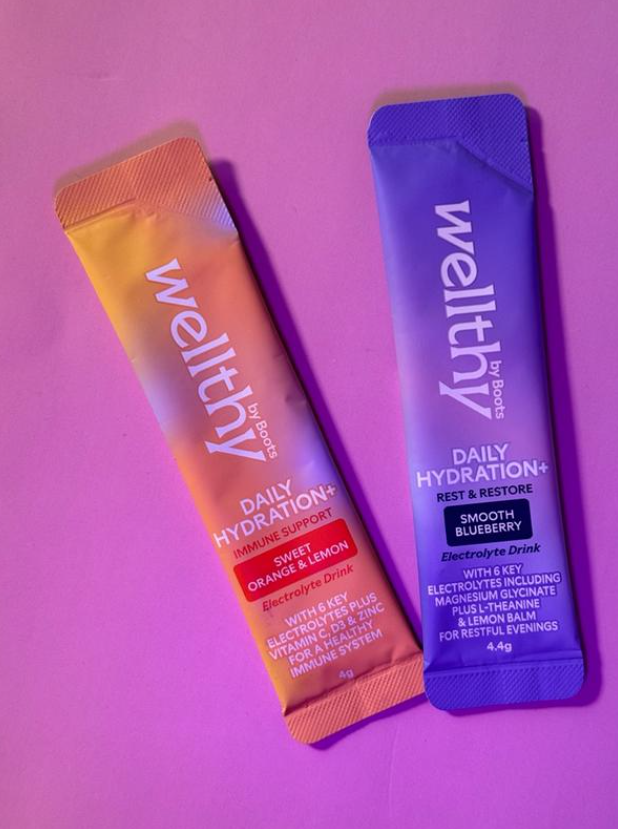
Wellthy by Boots Daily Hydration+ Electrolyte Powder, Mixed Bundle 48x Sachets
I’ve been trying to stay on top of my hydration this year, so the Wellthy by Boots Daily Hydration+ Electrolyte Powder mixed bundle has become an easy grab‑and‑go fix.
Each sachet turns plain water into a low‑sugar, vitamin‑packed drink with six key electrolytes plus added ingredients like collagen, hyaluronic acid and skin‑supporting nutrients, depending on the blend.
You just mix one with 500ml of water and it’s under 15 calories, free from artificial colours and flavours, and actually tastes good enough to drink all day.
With different variants covering everything from energy and immunity to hydration and rest, it’s a simple, feel‑good way to keep me going – whether I’m at my desk, out running errands or just trying to drink something other than Coca Cola Zero…

NARS Afterglow Lip Balm
I love NARS’ Afterglow Lip Balm because it’s buttery, sheer and gives my lips that juicy, non‑sticky shine I always reach for.
Thanks to its Moisture‑Locking Blend of mango seed oil, shea butter and vitamin E – plus hydrating hyaluronic acid spheres – it keeps my lips feeling soft and smoothed for up to 24 hours, which is ideal on busy days when I don’t want to think about reapplying.
It’s effortless, comforting and genuinely addictive to swipe on.

Honey Bun For My Honey Bun
If you fancy waking up to proper bakery vibes this weekend, Pophams has launched its Breakfast in Bed 2025 range – and they’ll even deliver on 14 February for Valentine’s.
The standout for me is the Honey Bun for My Honey Bun set (£30), which comes with a Honey Bun pastry and a cute matching hat.
Most pastries can be customised at checkout, and every order arrives with bespoke artwork by Amelia Newman plus a card, (for this weekend, or the V-Day one) you can leave blank or have handwritten.
Pre‑orders close February 12 for that, with delivery around 10am within two miles of London Fields.

Oliver Bonas Pink Sheep Knitted Tank Top
I’m always looking for those easy pieces that make autumn dressing feel a bit more pulled‑together, and this pink vest is exactly that.
It’s the perfect throw‑on layer over a shirt or a floaty dress, adding a hit of colour while giving you that extra bit of warmth.
The little sheep motif on the front gives it a playful twist, and the ribbed trims with a classic crew neckline keep it super easy to wear.
It’s one of those effortless staples that instantly lifts an outfit without trying too hard.

Laura Mercier Tinted Blur Balm
I’ve cannot wait to try the new Laura Mercier Tinted Blur Balm, and it’s such an easy way to get that soft‑focus, matte skin without piling on product.
It melts from balm to powder, giving sheer‑to‑medium coverage that blurs and smooths instantly, while peptides help refine texture over time.
The squalane and camelina seed oil keep skin calm and comfortable, so it feels like skincare but works like makeup – perfect for an all‑over tint or a quick bit of natural sculpting.

The Primark Scene | Oversized Striped Shirt
This oversized striped shirt from The Primark Scene range is such an easy throw‑on.
It’s 100% cotton with a bright yellow base and fine black‑and‑white stripes, and the dropped shoulders give it that relaxed, effortless shape I love.
The pink buttons add a fun touch, and the chest pocket, wide cuffs and curved hem keep it looking polished.
Perfect with jeans now and just as good over shorts when it warms up.

The Set 8 Piece Microfibre Frill Duvet Cover and Pillowcase Set with Fitted Sheets Green/White
I love a good bedding refresh, and this 2‑pack Green/White Microfibre Frill Duvet Set from THE SET is such an easy win.
You get two duvet covers, two fitted sheets and four pillowcases, so you can mix and match between the calming green and crisp white depending on your mood.
The microfibre is supersoft and cosy – and best of all, it doesn’t need ironing (a genuine life highlight).
The little ruffle trim adds a cute, textural touch without feeling fussy, and the whole bundle makes switching up your bedroom look completely effortless.

Next Red/Pink Striped Ceramic Vase with Strawberry Detail Handles
I really want to add this red and pink striped ceramic vase to my home – it’s one of those pieces that instantly lifts a shelf or side table.
The strawberry‑shaped handles give it a fun, slightly kitsch twist (in the best way), while the bold stripes keep it feeling fresh and modern.
It’s made from 100% stoneware and measures around 20.5cm tall, so it’s the perfect size for a small bunch of flowers or even left empty as a statement piece.
It’s the kind of home accessory that makes you smile every time you walk past it – and honestly, that’s my favourite kind of décor.

NEOM Wellbeing It’s All Rosy Scented Candle (3 Wick)
I’m a firm believer in the power of a good candle to completely shift a mood, and NEOM’s It’s All Rosy 3‑Wick Candle has become one of those scents I reach for when I need instant calm.
It smells exactly like freshly picked petals – soft, serene florals with this gorgeous, uplifting glow that feels almost like sunshine drifting in through the window.
As Alice du Parcq puts it, it’s as if the petals were lifted straight from the garden, filling your space with peaceful light and that gentle, clear-headed freshness that helps you reset and breathe again.
And honestly, that’s exactly how it makes my home feel.

Cheat On Roses by Della Vite x Velvet Smoke
If you’re not in the mood for cliché flowers this weekend – as a payday treat, let me introduce you to a far better option: the Cheat on Roses set from Della Vite x Velvet Smoke.
With this set, you get a bottle of Della Vite Rosé Prosecco (or Della Vite Zero if you prefer), a gold bottle stopper, the gorgeous Filthy Rose scented candle and a brass matchbox sleeve with matches.
It’s basically romance, but upgraded.
My ideal night? Strike a match, light the candle, and pour a chilled glass of Della Vite.
And if you somehow don’t finish it (unlikely), the branded stopper keeps the bubbles ready for round two.
Roses, candlelight, bubbles… all the classics, just with a lot more spark.

St. Tropez Cherry Macaron Kit
I’m making my tanning routine feel a bit more fun this season, and St. Tropez’s new Classic Tan x Cherry Macaron set is exactly the kind of sweet upgrade I didn’t know I needed.
Their iconic tanning mousse now comes with a cherry‑macaron scent – all juicy cherry, soft white florals and warm vanilla – plus a limited‑edition pink mitt and a new hair & body mist to match.
It still gives that natural-looking medium golden glow after eight hours, with a tinted guide colour that makes application foolproof and a quick‑dry, streak‑free finish.
Basically, it’s St. Tropez’s classic tan, but turned into a dessert‑level indulgence.

Space NK The Blush and Glow Edit
I’m a sucker for a good beauty edit, and this Blush and Glow Edit is exactly the kind of treat I’d pick up for myself and happily gift to someone I love.
Housed in the prettiest pink washbag, it’s packed with mini gems – from Westman Atelier’s Eye Want You Mascara, Tatcha’s Kissu Lip Mask and Vyrao’s sensual Ludatrix eau de parfum, to Summer Fridays’ Blush Butter Balm and a full‑size REFY Lip Gloss in Rosewood.
Together, they make the easiest, joy‑boosting little routine, all for £50 despite being worth over £117.
And honestly, the cushiony pink‑and‑red bag alone adds such a cute pop of colour to my everyday lineup.
It won’t be around for long, so whether you’re spoiling someone or leaning into some well‑deserved self‑care, I’d snap it up while you can.
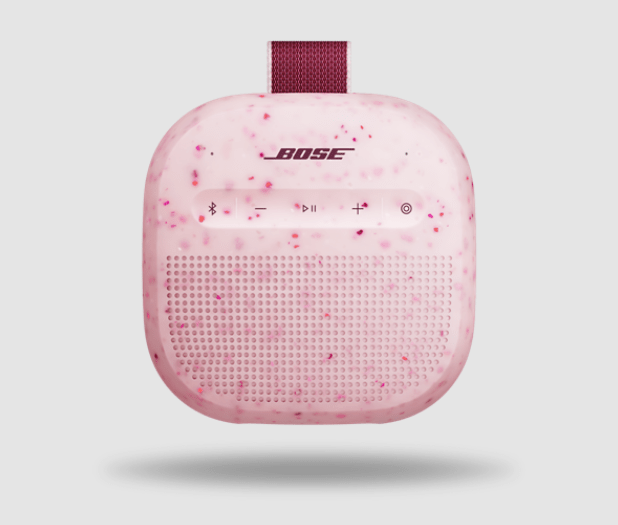
Bose SoundLink Micro Portable Speaker (2nd Gen)
I love a tiny gadget that overdelivers, and the Bose SoundLink Micro (2nd Gen) is exactly that.
It’s small enough to sit in the palm of your hand, but somehow still manages to pump out crisp, surprisingly powerful sound for up to 12 hours.
It’s built to handle pretty much anything – rain, splashes, being chucked in a bag – and it’s the perfect little speaker for those moments when you need music to fill the silence, whether you’re in the kitchen, in the park or on a weekend away.
Basically: tiny, tough and far louder than it looks.

Edge of Ember Heart White Sapphire Necklace
I love the Edge of Ember Heart White Sapphire Necklace because it feels effortlessly romantic without trying too hard.
The 7mm heart‑shaped white sapphire catches the light beautifully, and the 18k gold‑plated recycled sterling silver gives it that luxe, conscious feel I always look for.
It’s versatile enough to wear solo for a soft shimmer or layered with my everyday chains, and the 18‑inch length sits perfectly with almost everything you already.
It’s one of those pieces that instantly makes me feel more polished the moment I put it on.
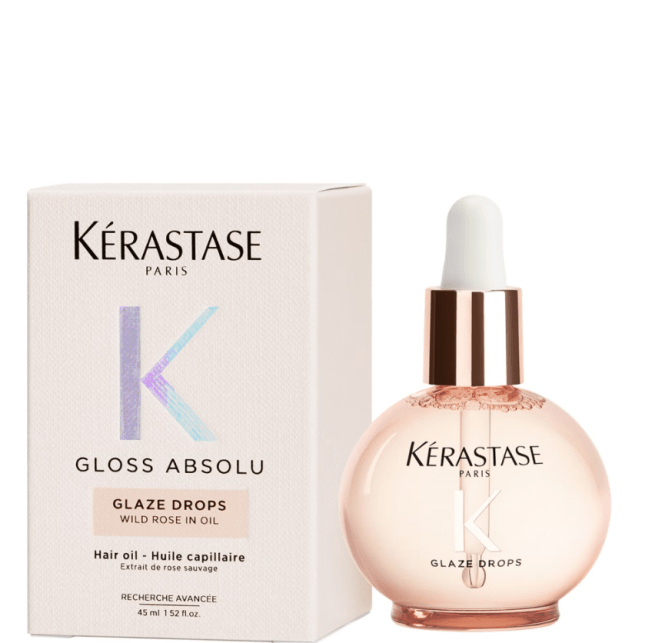
Kérastase Gloss Absolu Glaze Drops Hair Oil with Wild Rose 45ml
I’ve been reaching for Kérastase’s Glaze Drops constantly because they give my hair that glossy, bouncy, polished finish without any of the heaviness.
This lightweight oil – infused with Wild Rose in Oil – smooths frizz and adds shine in a way that feels more 'expensive blow‑dry' than 'styling product', and the precise dropper means I never overload my hair.
It leaves everything silky with no greasy residue, just a soft sheen that lasts.
And the scent? A gorgeous, haute‑couture mix of fresh citrus and a luxe floral bouquet that makes the whole thing feel far more special than a usual hair oil.
Have we missed anything? Or want to see more of something else? Let us know in the comments section!
Follow Metro across our social channels, on Facebook, Twitter and Instagram
Share your views in the comments below
Metro journalists select and curate the products that feature on our site. If you make a purchase via links on this page we will earn commission – learn more
Congrats, you finally made it past January payday!
After what felt like months waiting for that paycheck to land, you may have a long list of things you’ve been desperate to buy. But before you go wild, we’re here to make sure you’re shopping smart.
That’s exactly why we’ll be heading straight to Matalan. The high-street store is known for its bargain prices and stylish picks, with loads of fashion and homeware pieces that look much more expensive than they really are.
There are affordable picks across everything from fitness gear for working up a sweat in style – seriously, you don’t want to miss out on Matalan’s new and super chic Souluxe collection – or a new set of bedding to give your bedroom a refresh without breaking the bank.
While we’ve just about managed to resist adding absolutely everything to our shopping basket, we thought it’d be much more helpful to cherry-pick our favourite items in our guide below.
Best of Metro Deals
Get exclusive discounts with Metro Deals – save on getaways and spa days. Powered by Wowcher
Bannatyne Spa
Spa day for two with treatments, lunch & prosecco — save up to 57% off.

Other deals
Mystery Escape
Hotel stay with return flights from as low as £92pp — save on worldwide holiday packages.
Beach Retreat (Lanzarote)
4* Lanzarote beach holiday with flights — save up to 58%.
UK Getaway
4* Radisson Blu Durham stay with breakfast, spa access & late checkout — save 60% off.
Drive Supercars
3–12 lap supercar driving experiences from £16.99 — save up to 65%.
Whether you’re looking to spruce up your living space or add some new bits to your winter wardrobe, we’ve got you covered. Matalan is also offering free delivery when you spend over £19.99, when you enter the code DELIVERY at checkout.
Prices start from as low as £2.50, so we guarantee you’ll find something to treat yourself to, and still have plenty of your paycheck left over at the end.
Our Matalan top picks:

Souluxe Cream Padded Gilet
We’re heading into that weird weather phase where it’s too warm to need a giant puffer coat but not warm enough to ditch an outer layer completely.
This gilet is the perfect compromise. Throw it over gymwear or jeans for staying warm on your way to workout or in line for your local coffee shop.
Yep, we’ll take the lot.
Follow Metro across our social channels, on Facebook, Twitter and Instagram
Share your views in the comments below
Margot Robbie appeared on Jimmy Kimmel wearing a black lace naked dress by Alexander McQueen for the promotion of her new movie, Wuthering Heights.
29 Jan, 2026 | Admin | No Comments
‘I don’t have sex with my husband but we’re happy – are we weird?’

Agony aunt Coleen Nolan has advice for a reader who hasn’t had sex with her husband in years but notices their relationship is the best it has ever been, though she worries that may make them odd.
29 Jan, 2026 | Admin | No Comments
Pandora’s new Bridgerton collection is pure Regency glam – and just in time for season 4


Metro journalists select and curate the products that feature on our site. If you make a purchase via links on this page we will earn commission – learn more
Dearest gentle reader, if you haven’t heard, Bridgerton has made its triumphant return to our screens.
Series four landed on Netflix on January 29, and this time around, after being the subject of much speculation, we’re going to see how Benedict, Eloise, and Francesca’s journeys pan out.
However, whilst we’re indulging in the scandals and romance, jewellery brand Pandora has dropped their own diamonds of the season, and caught our attention with their very own Bridgerton collection.
The range sees a variety of twinkling jewels in dainty bracelets, sophisticated rings, and, of course, a variety of the brand’s delicate charms. Including a dance card and pencil, a tea bag, and an exquisite Butterfly & Bee option.
Get personalised updates on all things Netflix
Wake up to find news on your TV shows in your inbox every morning with Metro’s TV Newsletter.
Sign up to our newsletter and then select your show in the link we’ll send you so we can get TV news tailored to you.

Taking to Instagram to share the wonderful news with the ton, Pandora posted saying: ‘A new collection that blends Regency elegance with modern Rules to Love By. Starring the Ton’s finest @hannahfkdodd and Claudia Jessie.’ Hannah is known for playing Francesca Bridgerton, whilst Claudia plays the brilliant Eloise.
Fans were quick to flood the comments with excitement as one said, ‘Simply stunning! Can’t wait to get mine!’ Another followed with ‘This is wonderful, I love Bridgerton, I love Pandora. It’s like wowwwww I love it.’ ‘Omgg I’ve never seen anything so beautiful,’ replied a third.
Shop some of our favourites from the collection below:

Bridgerton Butterfly & Bee Splittable Dangle Charm
We’re simply obsessed with these two charms. Inspired by the iconic insects of the butterflies and bees featured in the show, you can get yourself a set of two for just £99. Coming in rich green and luxe blue man-made crystal stones, add these to your bracelet to give it a classy upgrade.

Bridgerton Blue Bow Necklace
If you’re looking for a birthday, anniversary or even a fancy Valentine’s gift, then look no further than this beautifully crafted bow necklace from the collection. It features a row of blue bow-set crystals with cubic zirconia diamonds splitting them up to make the wearer the belle of the ball and the talk of the ton for all of the right reasons.
Follow Metro across our social channels, on Facebook, Twitter and Instagram
Share your views in the comments below
29 Jan, 2026 | Admin | No Comments
Best new‑in Dunelm bedding sets to instantly refresh your bedroom

Metro journalists select and curate the products that feature on our site. If you make a purchase via links on this page we will earn commission – learn more
One of the best things that can lift your mood is sprucing up rooms in your home.
One room in particular that needs to make you feel good as soon as you walk into it is the bedroom – no one wants to walk into the boudoir and not feel at ease and cosy.
So, if your bedroom is feeling a little meh, consider this your sign. One of the quickest (and most affordable) ways to refresh your space is by switching up your bedding, and Dunelm has delivered with its latest launches.
From crisp cotton sheets to cosy textures and on-trend colours, these new-in bedding finds start from just £10 and make giving your bedroom a mini makeover feel effortlessly easy.
Shop our favourite new-in bedding from Dunelm:
Best of Metro Deals
Get exclusive discounts with Metro Deals – save on getaways and spa days. Powered by Wowcher
Bannatyne Spa
Spa day for two with treatments, lunch & prosecco — save up to 57% off.

Other deals
Mystery Escape
Hotel stay with return flights from as low as £92pp — save on worldwide holiday packages.
Beach Retreat (Lanzarote)
4* Lanzarote beach holiday with flights — save up to 58%.
UK Getaway
4* Radisson Blu Durham stay with breakfast, spa access & late checkout — save 60% off.
Drive Supercars
3–12 lap supercar driving experiences from £16.99 — save up to 65%.

Soiree Belfort Duvet Cover & Pillowcase Set
If you want to add a boutique hotel vibe to your bedroom, then this is the set for you.
The Soiree Belfort set instantly adds a refined, adult feel to the space with its rich beige and contrasting colourway. It’s polished and suave, without trying too hard.
Making when you jump into bed feel like a five-star experience.

Ditsy Floral 100% Cotton Duvet Cover & Pillowcase Set
Hop ahead into the upcoming season with this cute and cheerful set that guarantees to life you mood.
The ditsy floral design is a classic, and with good reason, as it’s a timeless print that complements any decor it’s put against.
It’s made from 100 per cent breathable cotton, perfect for everyday use or if you have guests staying over.

Emmy Frilled Stripe 100% Cotton Duvet Cover and Pillowcase Set
Put a fun twist on stripes with a bold injection of colour.
The frilled edge detailing immediately adds a playful touch, without making it look too childish, not that that would be a bad thing.
Available in pastel blue and pink candy, a striking fuchsia and red combo, or summery green shades, it’s an easy way to inject colour and personality into your bedroom.

Fogarty Soft Touch Duvet Cover and Pillowcase Set
One of the hottest colour trends for Spring is none other than Eucalyptus, and it’s no surprise when it brings nature inside in a subtle yet effective way.
This soft-touch set is all about cosy, no-fuss comfort, making your bed feel instantly more inviting without splashing the cash.
If this shade doesn’t tick your box, then luckily it’s available in another 19 colours, so everyone can find one they enjoy.

Tove Woodblock 100% Cotton Duvet Cover & Pillowcase Set
Bring a touch of boho into the bedroom with this creative pattern that oozes luxe and refinement.
The traditional woodblock print adds visual interest to the space without overwhelming it, making it appear considered and expensive.
Made from crisp 100% cotton, it strikes the perfect balance between calming and characterful.

Dorma Alderton 100% Cotton Sateen Duvet Cover & Pillowcase Set
This is pure luxury that you can feel the moment you slip into bed. With its silky finish, the Dorma Alderton set brings a hotel-worthy smoothness that instantly elevates not just your bedroom, but also your sleep routine.
It’s an investment piece that makes every night feel a little more indulgent.

Sophie Robinson Beldi Floral 100% Cotton Duvet Cover & Pillowcase Set
Go full on with this joyful and maximalist print from Sophie Robinson’s collection with Dubelm.
The vibrant floral design is an instant mood-lifter, turning your bed into the focal point of the room.
Perfect if you love colour and want your bedroom to feel expressive, creative and unapologetically happy.

Henley Striped Polycotton Duvet Cover & Pillowcase Set
This classic design brings a clean, fresh feel to your bedroom, proving you can never go wrong with stripes.
The easy-care polycotton makes it practical for everyday use, while the timeless pattern keeps things feeling calm, comfortable and stylish.
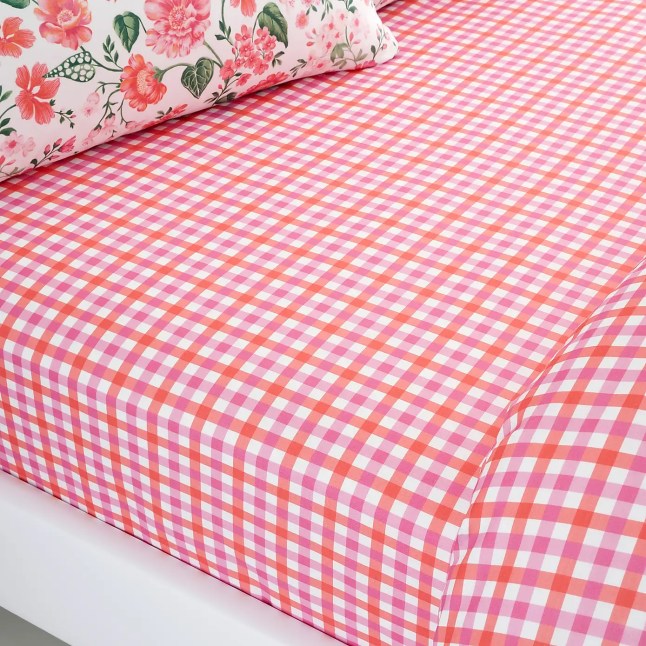
Eden Floral Polycotton Fitted Sheet
It doesn’t always have to be about what’s on the duvet cover to make an impact.
Opt for a fitted sheet that, when you pull the covers back, reveals a bold surprise in the best way.
Part of the Eden Floral range, this option is one that embraces the upcoming springtime, whilst providing comfort with its 144 thread count, meaning you won't find yourself overheating.
If you really love it, you can get it in bedding and even curtains.
Follow Metro across our social channels, on Facebook, Twitter and Instagram
Share your views in the comments below
Tom Cruise and his staff were seen leaving his Knightsbridge penthouse overlooking Hyde Park with packed-up boxes for what has been reported to be a new chapter in America
29 Jan, 2026 | Admin | No Comments
9 of the most stylish trainers that make walking 20,000 steps bearable


Metro journalists select and curate the products that feature on our site. If you make a purchase via links on this page we will earn commission – learn more
Let’s be honest, 20,000 steps sounds impressive until you’re halfway through and questioning every life choice you’ve ever made, and the last thing you need is for your footwear to let you down.
Whether you’re embarking on a trek, partaking in a long commute, power-walking your way through a city break, or traipsing around Walt Disney World, you need to be assured you won’t be wobbling like a penguin an hour in.
The good news? You no longer have to sacrifice style for comfort. From cushioned soles and supportive tech to silhouettes that complement jeans, dresses and everything in between, these trainers are designed to go the distance, without leaving you desperate for a sit down.
Consider this your edit of the most stylish pairs that make walking 20,000 steps feel… almost enjoyable.
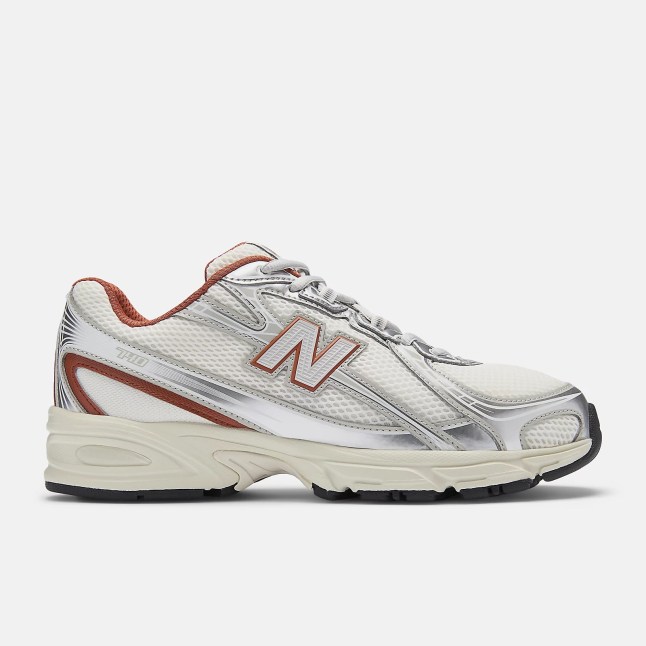
New Balance 740 Trainers
One of the most trusted trainers around has to be New Balance’s 740.
The classic gets a stylish update with breathable mesh overlays, an ABZORB™ midsole for cushioned, springy support, and a fresh two-toned design that keeps things interesting.
Fans are obsessed – one reviewer said, 'I bought them for Disney, and my feet are barely tired after 12+ hours in the park!'
Clearly, these are built to go the distance in comfort and style.
Best of Metro Deals
Get exclusive discounts with Metro Deals – save on getaways and spa days. Powered by Wowcher
Bannatyne Spa
Spa day for two with treatments, lunch & prosecco — save up to 57% off.

Other deals
Mystery Escape
Hotel stay with return flights from as low as £92pp — save on worldwide holiday packages.
Beach Retreat (Lanzarote)
4* Lanzarote beach holiday with flights — save up to 58%.
UK Getaway
4* Radisson Blu Durham stay with breakfast, spa access & late checkout — save 60% off.
Drive Supercars
3–12 lap supercar driving experiences from £16.99 — save up to 65%.

On Cloud 6 Trainers
Feel fully supported whilst giving your outfits a stylish finish with the likes of On’s Cloud 6 Trainers.
Available in over 10 colourways, no matter what your preference is, everyone will be able to find a style that suits their personal choice.
Combining the brands' zero-gravity CloudTec®, new sockliner for easier step-in, and a boarder fit for maximum comfort, this is a style that will feel like a walk in the park.
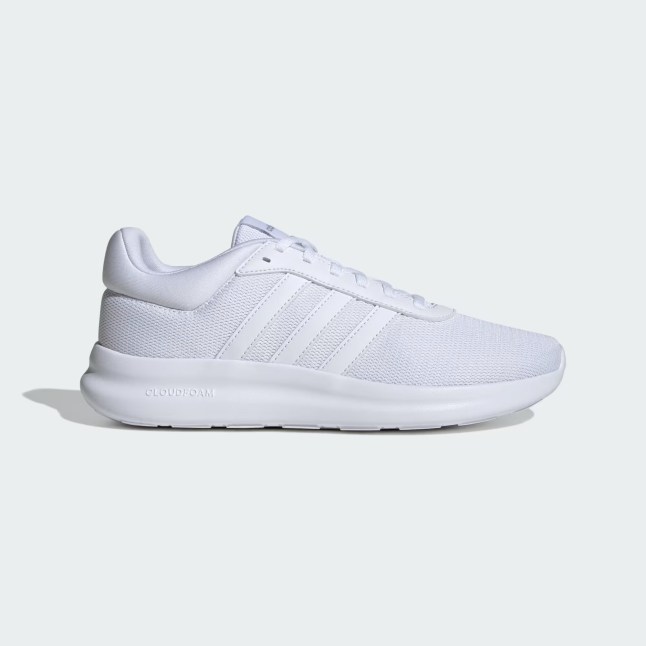
adidas Lite Racer 4.0 Shoes
Comfort doesn’t have to break the bank.
This option from adidas will have you wondering if you actually have anything on your feet with their super lightweight trainers.
Specially designed with a Cloudfoam midsole, it keeps your sole fully supported whether you’re roaming a new city or going out for your daily walk.
The simple design allows them to be effortlessly styled with any outfit.

Clarks Pace Rise
Put a literal spring in your step with these butter-yellow trainers that prove comfort and style can, in fact, coexist.
Not only are they bang on trend, but they’re packed with clever science, too.
The Infinity Energy Capsules™ in the sole compress and rebound as you walk, giving you a subtle boost with every step (no coffee required).
Add a fully moulded heel to reduce friction and a C-tread™ rubber outsole for grip, and you’ve got trainers that work just as hard as you do.
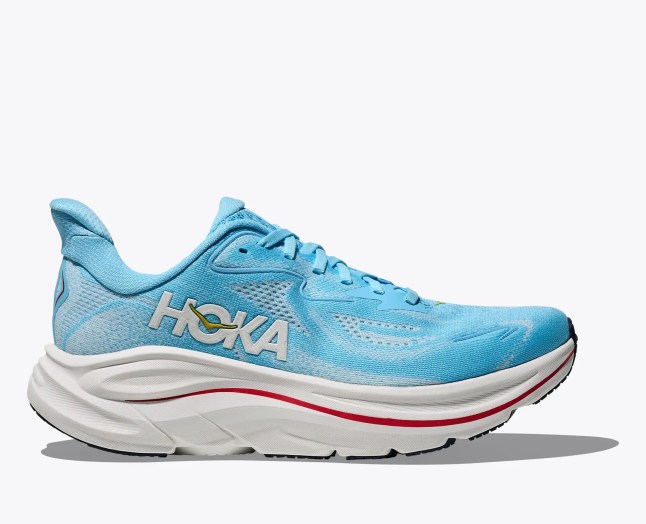
Hoka Clifton 10 Trainers
The HOKA Clifton 10 is basically like walking (and running if you choose to) on a cloud – but one that actually supports your feet.
This latest version takes everything consumers loved about the classic Clifton and turns it up with extra cushioning, a breathable jacquard upper and a cosy fit that feels snug without being tight.
Selected styles are available in wide fit, so you can get the best fit possible.
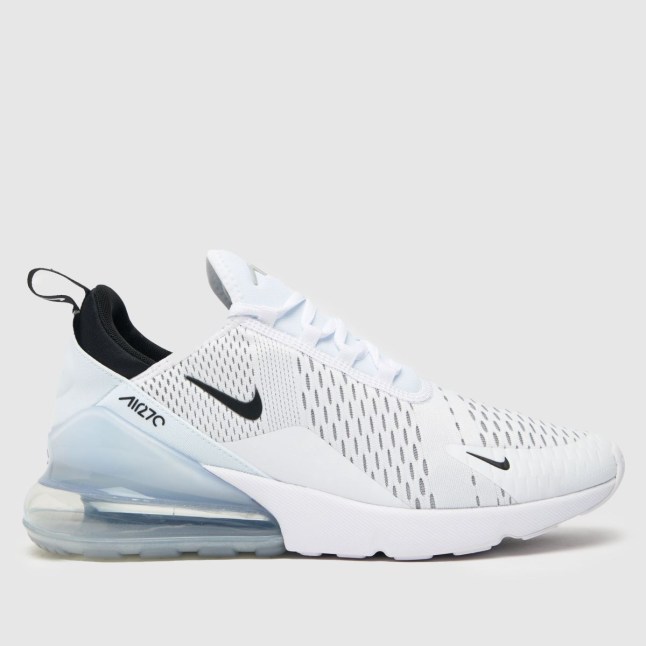
Nike Air Max 270 in White & Black
Nike Air Max 270 Trainers are the sort of trainers that make 20,000 steps feel way more doable.
Thanks to Nike’s iconic cushioning in the heel, every stride feels springy and soft, giving you that all-day comfort vibe whether you’re roaming the city or just chasing errands.
The breathable upper keeps things light and airy, and the rubber outsole adds grip on all surfaces, so you can walk, explore and wander without wanting to take them off.
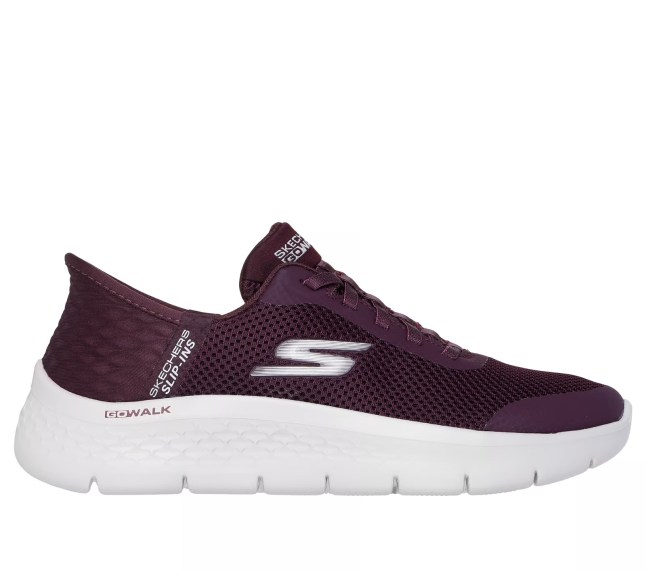
Skechers Slip-ins: GO WALK Flex – Grand Entry
Imagine you could get trainers that feel like slippers? Well, Sketchers come pretty close.
Zero fuss and easy to slip on, the Go Walk style comes fitted with an Air-Cooled Memory Foam® insole that makes it feel like your feet are receiving a hug whilst on the go without overheating.
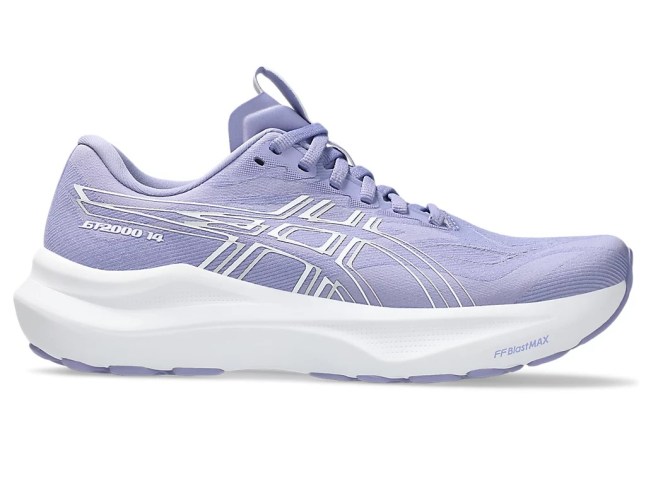
Asics GT-2000 14
Designed with runners in mind, the ASICS GT-2000 14 effortlessly bridges performance and everyday style.
It strikes the perfect balance between cushioning and stability, thanks to PureGEL™ technology that boosts softness and absorbs impact with every step.
The result? A trainer that helps you walk further, feel supported and avoid that end-of-day foot ache.
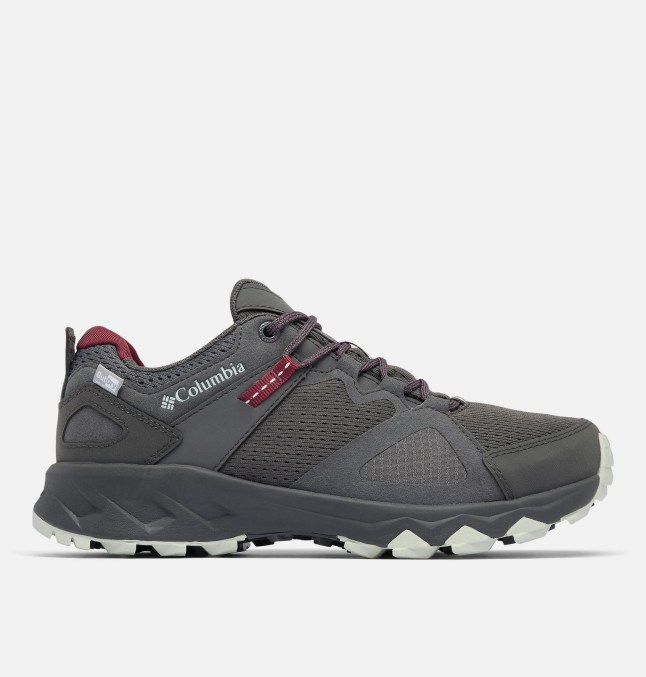
Columbia Women's Peakfreak™ Hera II OutDry™ Hiking Shoe
If you want a strong, durable pair that will see you through various adventures in the rain, mud, or harsher conditions, then look no further.
Constructed with OutDry™ waterproof tech to keep feet dry and breathable mesh for comfort, the Peakfreaks also have responsive Techlite+™ cushioning and a grippy Adapt Trax™ outsole for tackling trails (or weekend wanderings) with confidence.
Perfect for outdoor lovers and city explorers alike.
Follow Metro across our social channels, on Facebook, Twitter and Instagram
Share your views in the comments below
28 Jan, 2026 | Admin | No Comments
Lady Amelia Spencer inherits aunt Princess Diana’s style rebellion in plunging crop top

Lady Amelia Spencer showed off her aunt Princess Diana’s style rebellion in plunging crop top in a joint appearance with her sister, Lady Eliza Spencer, at the Gaurav Gupta Haute Couture show at Paris Fashion Week on 27 January.
28 Jan, 2026 | Admin | No Comments
Carol Kirkwood’s quiet Windsor home to retreat to with ‘gorgeous’ husband Steve

Get all the details on meteorologist and TV star Carol Kirkwood’s Windsor home with her husband Steve where she will relax amid the news that she has stepped away from BBC Breakfast.




